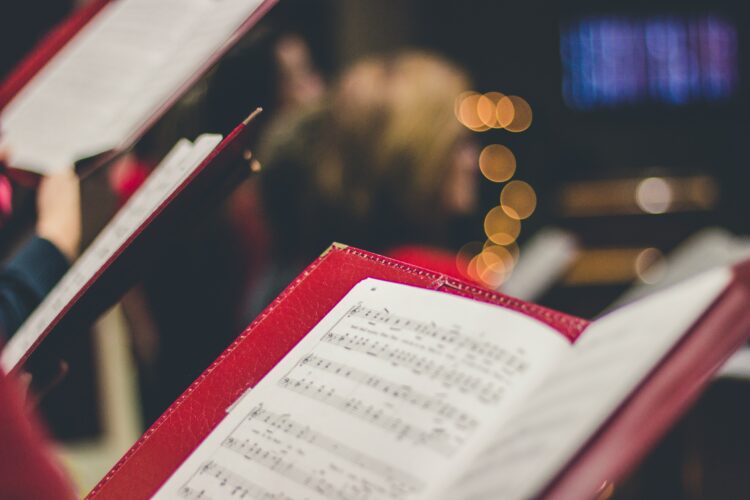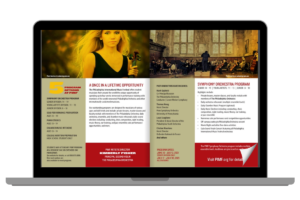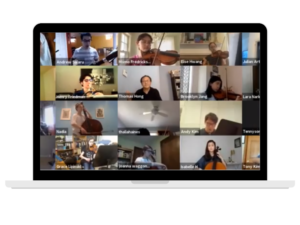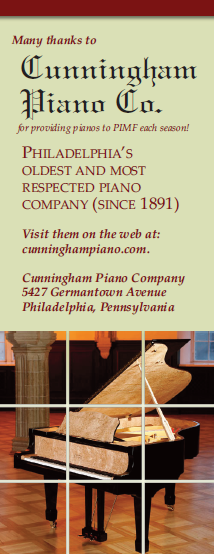Most major orchestras play the same piece every Christmas season. That piece, of course, is Handel’s Messiah.
Only the first section of this sprawling oratorio deals with the birth of Christ, with the second and third sections focused on his on his death, resurrection, the sending of the Spirit at Pentecost, and the final resurrection of all believers. The work actually premiered in Dublin on April 13, 1742 — 19 days after Easter that year, leading many musicologists to argue that Handel envisioned the composition as an Easter piece.
Still, this venerable holiday warhorse is most often performed during Advent, and it becomes an annual repertoire staple for classical music performers throughout the world over very quickly when they embark on their professional careers.
“I have performed the Messiah countless times over the years, both as a choral singer and as a soloist,” says Rich Galassini, co-owner of PIMF’s piano partner, Cunningham Piano Company. “For me, the holiday season doesn’t start until I have at least heard or sung the tenor recitative and aria ‘Comfort Ye; Every Valley’ that opens the Messiah.”
As most music lovers know, Messiah was warmly received in Dublin, but not as highly praised a year later when it premiered in Handel’s adopted home, London. In fact, it was another hundred years before its star really began to rise during the Victorian era and the tradition of pre-Christmas performances by amateur and professional choirs began.
While the chorus is front and center in the work (and here is a link to the powerful words of this celebrated piece!) it is supported by organ and/or orchestra, and like many massively popular pieces, musicians who return to it year after year either savor the comfort of a well-worn ritual or stifle the ennui of redundancy. What’s not up for debate, is that concert-goers of all faiths adore it.
For Rich Galassini, the Messiah circuit over the years has become a treasured social tradition: “Having been asked by many friends over the years to perform it as a soloist with their regional choir or church, it has also been a way to stay in touch and stay connected with other musicians.”
Some interesting facts about this holiday mainstay and its composer:
- While Messiah was a genre-bending departure for Handel, his early English-language oratorios performed at Oxford’s Sheldonian Theatre in the early 1730s were so popular that undergraduates reportedly sold their furniture to raise the money for the five-shilling tickets.
- Handel said about this piece – while composing it – that he imagined seeing heaven before his very eyes and “the great God Himself” enthroned in glory.
- The music for Messiah was completed in 24 days, over which Handel reportedly ate and slept very little.
- For the Dublin premier in 1742, Handel recruited the combined choirs from St Patrick’s and Christ Church cathedrals, which amounted to 16 men and 16 boy choristers; several of the men were assigned solo parts and joined by two female soloists.
- Seven hundred people attended the inaugural performance, with gentlemen asked to remove their swords, and ladies asked not to wear hoops in their dresses, to accommodate the crowd.
- The Dublin premiere was a benefit concert for prisoners’ debt relief and two hospitals. The box office take of around £400 provided about £127 to each of the three charities and secured the release of 142 indebted prisoners.
- The custom of standing for the “Hallelujah” chorus originates from a popular belief that King George II did so at the London premiere, which would have forced everyone to stand as well.
- The chorus begins with verses from the Book of Isaiah in the Hebrew Bible (Comfort ye, comfort ye my people, saith your God. Speak ye comfortably to Jerusalem, and cry unto her, that her warfare is accomplished, that her iniquity is pardoned. The voice of him that crieth in the wilderness; Prepare ye the way of the Lord; make straight in the desert a highway for our God.). It ends with verses from the Book of Revelations in the New Testament (Worthy is the Lamb that was slain, and hath redeemed us to God by His blood, to receive power, and riches, and wisdom, and strength, and honor, and glory, and blessing. Blessing and honor, glory and power to be unto Him that sitteth upon the throne and unto the Lamb, for ever and ever. Amen.)
Whether you show up for a concert with score in hand or just to sit back and absorb Handel at his Baroque best, you can’t help but feel enveloped by a sense of community. At its core, Messiah is a work of great joy, and that’s worth revisiting as often as possible.
May Handel’s masterpiece become an old friend for yours too, no matter what other family traditions you find yourself enjoying this holiday season!




